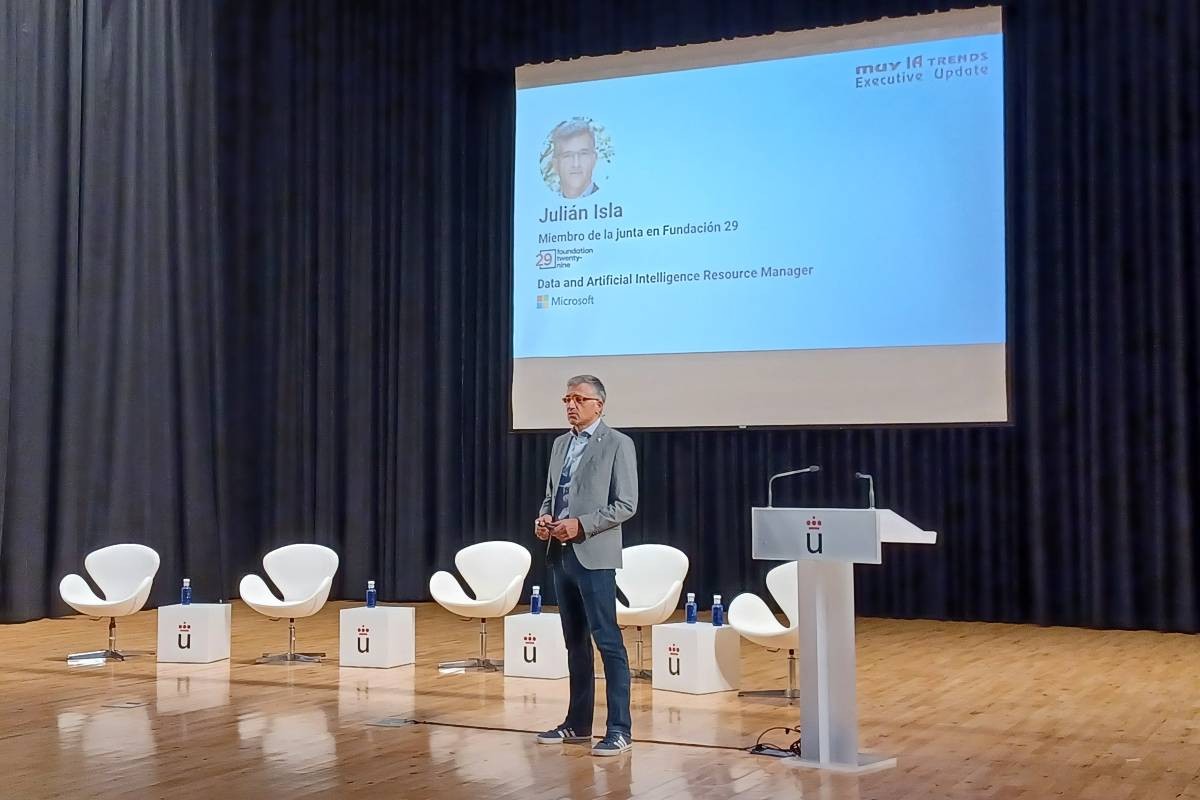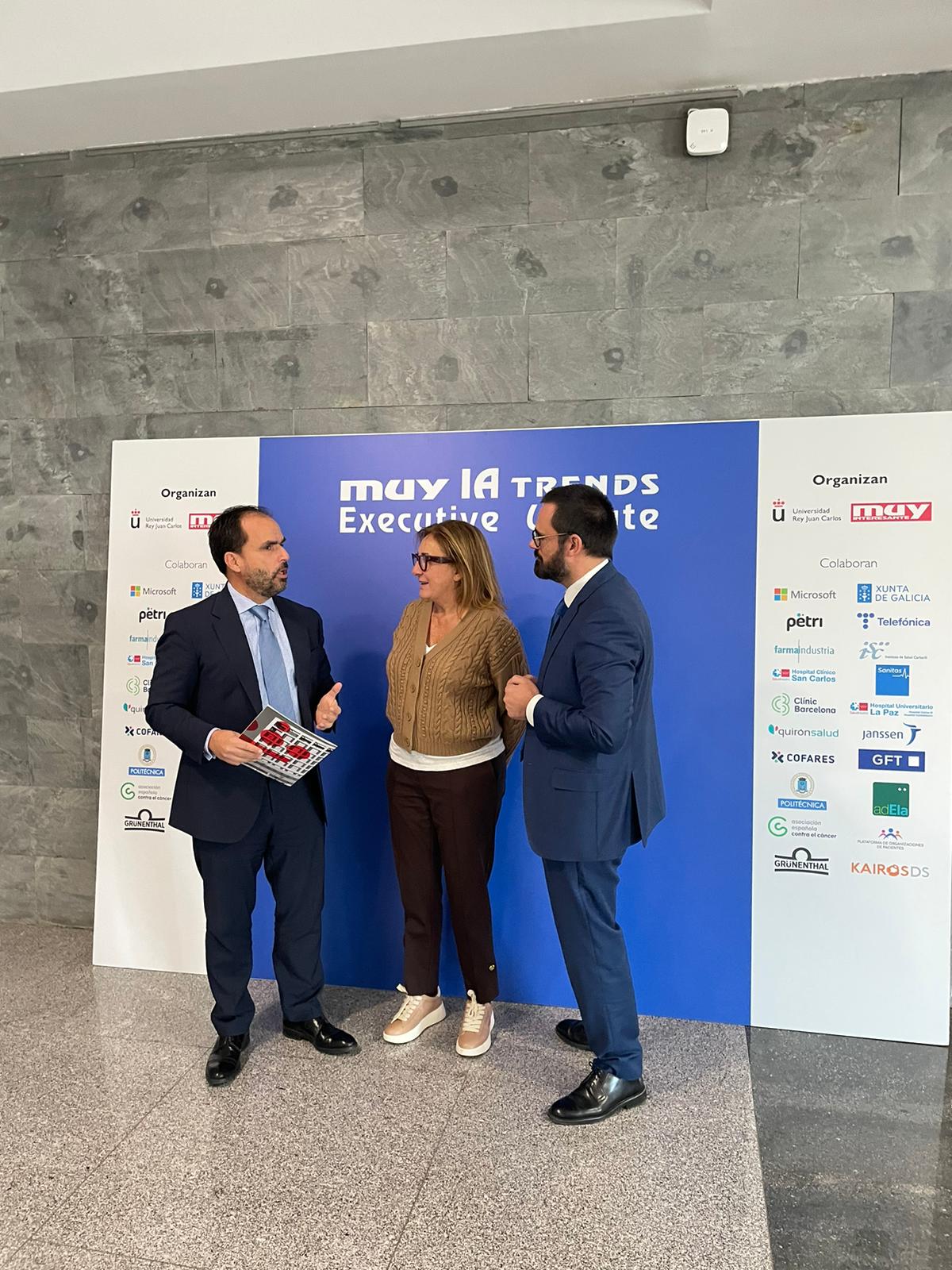Writing/Raúl García Hémonnet
Top-level specialists in Artificial Intelligence and Health met today, Friday, in the assembly hall of the Rectorate building on the Móstoles campus of the URJC.
There, throughout the morning they have reflected on the changes that AI is already bringing to the field of health, from the point of view of making a diagnosis, planning treatments or creating new drugs, among many other aspects.
Julián Isla, director of Fundación 29, member of the EMA's Orphan Drugs Committee and Microsoft employee in the area of data and AI, was in charge of opening the presentations of this event by presenting his vision on how generative artificial intelligence is ready to transform medicine. This expert has reviewed the recent history of AI, from machine learning to current generative AI, capable of creating new content. Specifically, he has shown examples of models such as DALL-E for images and ChatGPT for text, capable of generating content autonomously from indications. “Generative AI has great potential for tasks such as diagnosis, report generation, medical imaging, medical record summaries, and decision support,” he said. So much so that, as he has predicted, "it may represent a new technological revolution on par with historical milestones such as electricity or the internet."

From there, the session has been structured into three blocks related to AI trends in healthcare, innovation, and patient treatment, mainly.
In the first block, IA Trends in Healthcare, Benigno Roson, deputy director general of Information Systems and Technology of the Ministry of Health of the Xunta de Galicia, has outlined how healthcare operators (hospitals, insurers, large consultancies) are incorporating AI to improve clinical practice, processes, accessibility and management. Through its recently approved plan, Galicia is launching an important set of initiatives and investments related to all of this.
Regarding the second section, in the AI Trends in Innovation section it has been shown that innovation centers are fundamental protagonists in the evolution of AI in the field of health. Specifically, Eva Aurín, eHealth manager at Telefónica Spain, has analyzed issues related to innovation and the development of new molecules, treatment models, drugs and greater efficiency in clinical trials and the acceleration of all the processes they entail. “AI is a disruptive technology that is advancing by leaps and bounds in all sectors we know. In Health, its cruising speed is slower, but little by little it is being introduced into health systems, helping in all phases of the care process, from diagnosis to rehabilitation.” This expert has assured that AI is helping drug design and the prediction of molecular behavior and that, "although it may seem like science fiction, AI could replace clinical trials with animals and humans."
And in the third table, AI Trends for Patients, it has been made clear by Julio Mayol, director of the Innovation group at the San Carlos Health Research Institute (IdSSC), how patients benefit from the practical results of AI in the field of diseases and what their expectations are about what it can bring them in the near future. Thus, he has celebrated that generative AI is revolutionizing access to information in the health sector by allowing patients to directly obtain biomedical and health knowledge in a fast and personalized way, although he has regretted that the quality of the knowledge has not yet been validated. shared.
As all the experts in this first edition of IA Trends have agreed, in the world of science applied to people, artificial intelligence represents a revolution in health care, with the power to personalize treatment, predict epidemics and liberate to healthcare professionals from administrative tasks, thus improving the quality of life of patients and providers alike. It also poses great challenges regarding the adaptation of the current system to the needs of AI, the access and volume of data required, and the ethical and training limits.
The rector of the URJC, Javier Ramos, commented that, from the university, as a “committed promoter of research in the university environment and as a professional specialized in the application of big data to health, we could not miss the opportunity to host “this new collaborative format at the service of artificial intelligence.”

A day to learn first-hand about the main trends and changes that Artificial Intelligence will cause in the world of health.



